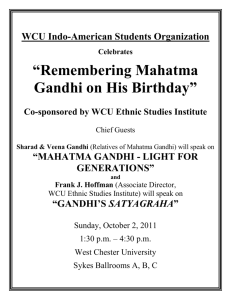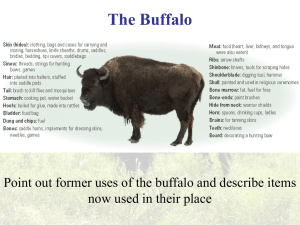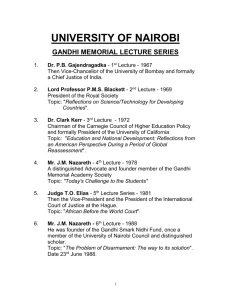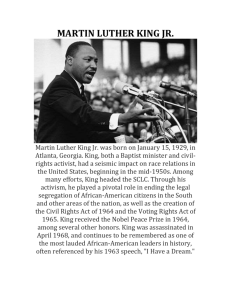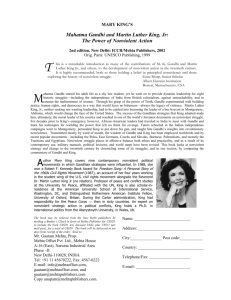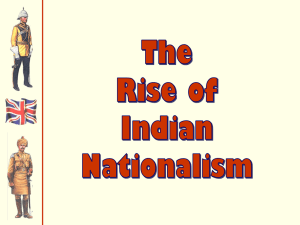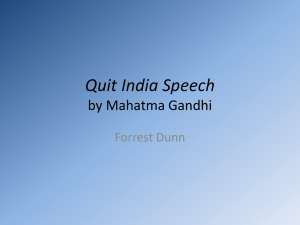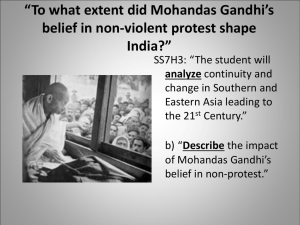Compare and Contrast Gandhi and Dr
advertisement
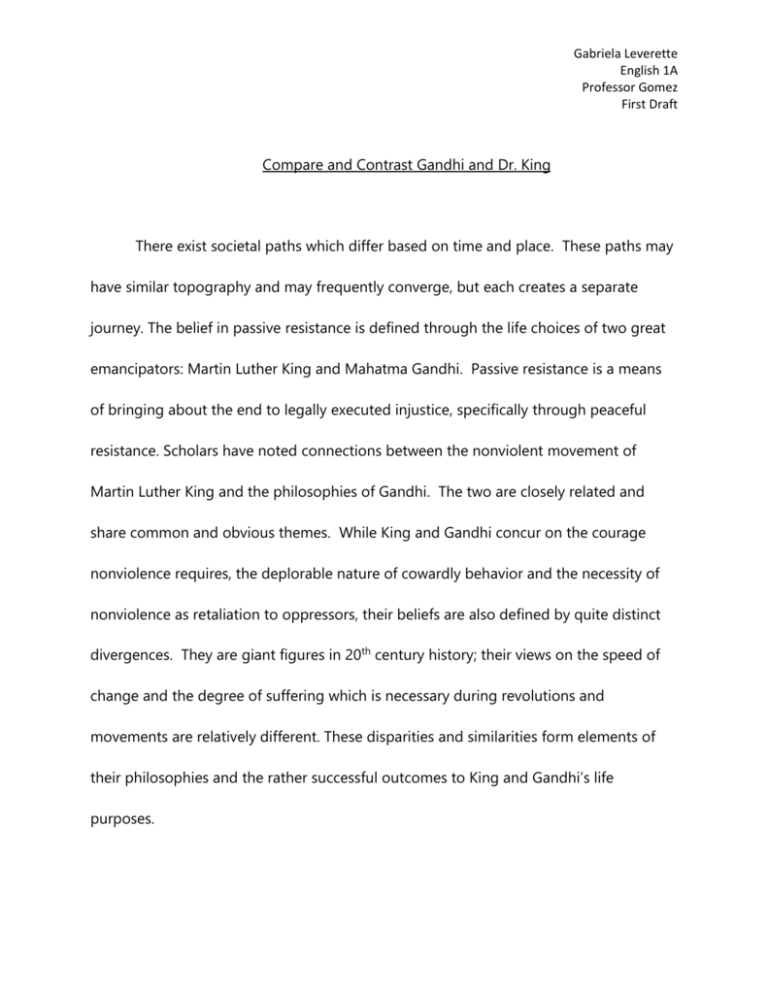
Gabriela Leverette English 1A Professor Gomez First Draft Compare and Contrast Gandhi and Dr. King There exist societal paths which differ based on time and place. These paths may have similar topography and may frequently converge, but each creates a separate journey. The belief in passive resistance is defined through the life choices of two great emancipators: Martin Luther King and Mahatma Gandhi. Passive resistance is a means of bringing about the end to legally executed injustice, specifically through peaceful resistance. Scholars have noted connections between the nonviolent movement of Martin Luther King and the philosophies of Gandhi. The two are closely related and share common and obvious themes. While King and Gandhi concur on the courage nonviolence requires, the deplorable nature of cowardly behavior and the necessity of nonviolence as retaliation to oppressors, their beliefs are also defined by quite distinct divergences. They are giant figures in 20th century history; their views on the speed of change and the degree of suffering which is necessary during revolutions and movements are relatively different. These disparities and similarities form elements of their philosophies and the rather successful outcomes to King and Gandhi’s life purposes. Gabriela Leverette English 1A Professor Gomez First Draft Martin Luther King is one of the most renowned activists in American history, most legendarily for standing up for racial equality through the seemingly new technique of nonviolence. His notoriety spread beyond our shores and Reverend King gained world fame. Many now consider him nothing short of a martyr in the cause of racial equity. Other activists sharing King’s plight (enduring racism and hypocrisy in a modern western democracy) during this time were quick to use violence to fight violence and thus King’s process was not always accepted with much zeal. The Black Panthers and the Black Muslim movement incited the passions of frustrated and abused minorities. For a time, the more militant political movements created the type of drama that could have ignited our entire country in civil war. The militants accused Dr. King of being an “Uncle Tom” and a “step-and-fetch-it” and he was repeatedly derided by the more radical forces for social change. In light of the police brutality and constant attack by not only white but minority races as well, King found himself in jail alone on more than one occasion. Though many seemed baffled by the reasoning and necessity of nonviolence, Martin Luther King had seen its previous application by Mahatma Gandhi in India. Many argued that India was a different culture, had a different history, and had different circumstances (based on caste rather than race and imperialism rather than patriotism). Gabriela Leverette English 1A Professor Gomez First Draft Gandhi’s country was in a constant battle with the overbearing control of Great Britain and its diminishing imperial powers. It had once been asserted that “the sun never sets on the British Empire.” However, in the post World War II era, The United Kingdom was faltering under economic hardship and Ghandi saw the limitations of England’s weakening control. Gandhi viewed nonviolence as an opportunity to show the brutality of Britain’s legal measures through contrasting them to his followers’ calm protests, sustained boycotts and life-endangering fasts. Nonviolence was used by both King and Gandhi to draw focus to their oppressors appalling actions and show the media and society that King, Gandhi, and their pacifist supporters were not the savage and uneducated people they had been portrayed as in the media. All humans, no matter their race or nationality, undoubtedly deserve to be treated humanely, whether equity is achieved with equal legal rights, or in a country free of foreign tyranny and civil unrest. Strategic nonviolence was the catalyst for various movements thereafter and when truly used with motives of love and truth, the outcomes have been most favorable. The pacifist agenda was regulated by specific codes and expectations, which empowered the movement and hastened the desired outcomes. Both Gandhi and Dr. King understood a consciousness that is required to alter an entire culture and influence the world. The nonviolent agenda has four core Gabriela Leverette English 1A Professor Gomez First Draft elements: Fact gathering to determine the degree of injustice; negotiations to balance the outcome; self-purification to ensure the correctness of intent; and direct action to make change through actively passive resistance. The clear distinction between Gandhi and Dr. King is evident in which step defines their life purpose as social activists. Gandhi is firmly located at step three. His focus was on preparedness in spirit. Gandhi asserted that the mind must be in the right place – not only in social activism, but also in daily life. His cerebral approach put actions in a secondary role. Martin Luther King, Jr. knew that African-Americans had suffered enough. The self-purification that was so essential to Gandhi was, in the United States, a ritual that had been brutally repeated through centuries of enslavement, torture, lynching, rape, and debasement. Dr. King found himself firmly rooted at step four, ready for action and tireless against racial hatred. He embraced nonviolence as a dynamic action, an assertion of will, which would give love, equity, and peace ascendancy over hatred, inequity, and violence. For Reverend King and his adherents, physical choices are the embodiments of spirit and mind; action is the only realistic manifestation of faith. Martin Luther King and Mahatma Gandhi lived extremely disparate lives by anyone’s standards but their application of nonviolence into their respective movements Gabriela Leverette English 1A Professor Gomez First Draft was seen by them as the only method that could possibly stand the test of the media, societal criticism and their respective conscious’s. Gandhi and King both recognized that love, or in Gandhi’s words “soul force”, was the most pure motive and applied that in their daily lives. King saw himself warranted in his actions against segregation because his primary motivator was love, and all change that resulted from his movement would be towards more equal treatment and not that of the perpetuation of unjust laws. “Any law that degrades human personality is unjust. All segregation statutes are unjust because segregation distorts the soul and damage the personality,” and those laws were what Gandhi and King were fighting against. Many onlookers and people in opposition saw them as anarchists or people who were in violation of the law, but when law is used to deface a race, to reduce people to subhuman categories and strip them of all identity and independence, then those laws should be done away with. Gandhi and King were famous for what they wrote, but more importantly the effect their words had, be they spoken or written, on thousands of oppressed people in their countries and around the world.

